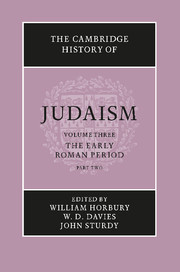Book contents
- Frontmatter
- 1 The archaeology of Palestine 63 bce–ce 70
- 2 The Herodian Temple
- 3 Recent archaeology in Palestine: achievements and future goals
- 4 The contribution of Jewish inscriptions to the study of Judaism
- 5 The social, economic and political history of Palestine 63 bce–ce 70
- 6 The Diaspora in the Roman period before ce 70
- 7 The Gentiles in Judaism 125 bce–ce 66
- 8 Gentiles as seen by Jews after ce 70
- 9 The synagogue
- 10 The Temple and the synagogue
- 11 The early liturgy of the synagogue
- 12 Women in the synagogue
- 13 The Pharisees
- 14 The Sadducees – their history and doctrines
- 15 The Essenes
- 16 The baptist sects
- 17 The troublemakers
- 18 The Samaritans and their sects
- 19 Galilean Judaism and Judaean Judaism
- 20 Jesus: from the Jewish point of view
- 21 Paul: from the Jewish point of view
- 22 Jewish Christianity
- 23 Apocalyptic: the disclosure of heavenly knowledge
- 24 The Qumran sectarian writings
- 25 The Dead Sea Scrolls and pre-Tannaitic Judaism
- 26 Prayer in the Qumran Texts
- 27 Philo of Alexandria
- 28 Josephus (ce 37–c. 100)
- 29 The rabbi in second-century Jewish society
- 30 The Hellenistic–Roman Diaspora ce 70–ce 235: the archaeological evidence
- 31 The legacy of Egypt in Judaism
- 32 Jewish elements in gnosticism and magic c.ce 70–c.ce 270
- Bibliographies
- Index
- References
21 - Paul: from the Jewish point of view
Published online by Cambridge University Press: 28 March 2008
- Frontmatter
- 1 The archaeology of Palestine 63 bce–ce 70
- 2 The Herodian Temple
- 3 Recent archaeology in Palestine: achievements and future goals
- 4 The contribution of Jewish inscriptions to the study of Judaism
- 5 The social, economic and political history of Palestine 63 bce–ce 70
- 6 The Diaspora in the Roman period before ce 70
- 7 The Gentiles in Judaism 125 bce–ce 66
- 8 Gentiles as seen by Jews after ce 70
- 9 The synagogue
- 10 The Temple and the synagogue
- 11 The early liturgy of the synagogue
- 12 Women in the synagogue
- 13 The Pharisees
- 14 The Sadducees – their history and doctrines
- 15 The Essenes
- 16 The baptist sects
- 17 The troublemakers
- 18 The Samaritans and their sects
- 19 Galilean Judaism and Judaean Judaism
- 20 Jesus: from the Jewish point of view
- 21 Paul: from the Jewish point of view
- 22 Jewish Christianity
- 23 Apocalyptic: the disclosure of heavenly knowledge
- 24 The Qumran sectarian writings
- 25 The Dead Sea Scrolls and pre-Tannaitic Judaism
- 26 Prayer in the Qumran Texts
- 27 Philo of Alexandria
- 28 Josephus (ce 37–c. 100)
- 29 The rabbi in second-century Jewish society
- 30 The Hellenistic–Roman Diaspora ce 70–ce 235: the archaeological evidence
- 31 The legacy of Egypt in Judaism
- 32 Jewish elements in gnosticism and magic c.ce 70–c.ce 270
- Bibliographies
- Index
- References
Summary
If any one were to be singled out as having done most to ensure that the movement inaugurated through the life, death and resurrection of Jesus of Nazareth became predominantly Gentile in a few decades, it was a Jew. He did so with no intention that it should thereby be divorced from Jews; the threat of its becoming so caused him great agony. His Jewish name was Saul and his Roman, Paul, which in his extant works written in Greek he naturally preferred. We know of him from letters which he wrote to churches, usually those which he himself had founded. We shall here use those letters which are generally agreed to be Pauline – 1 Thessalonians, Galatians, 1 and 2 Corinthians, Romans, Philippians, Philemon – but also more cautiously 2 Thessalonians and Colossians despite the doubts cast upon their authenticity. Unfortunately, none of them is addressed to a purely Jewish or to a Palestinian church. Acts, devoted for the greater part to Paul, is a secondary source, whose historical value cannot be casually dismissed, but must, however, be subordinated to that of the explicit and implicit history in the Epistles. The strictly Jewish sources, the Mishnah, the Midrashim and the Talmud, do not refer to Paul directly: cryptic references to him testily uncovered in these add nothing of significance. This almost total silence points to the intensity of Jewish opposition to Paul from the very beginning. Other apostates from Judaism such as the Tannaite Elisha ben Abuyah (Aher) continued to be referred to by the Sages; Jesus found a place in the Talmud.
- Type
- Chapter
- Information
- The Cambridge History of Judaism , pp. 678 - 730Publisher: Cambridge University PressPrint publication year: 1999

